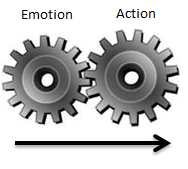Three Antidotes to Anger
When we’re carried away by anger, it often seems to have a life of its own and we’re left wondering what we can do to feel and act better. This article will show three antidotes to the anger infection.
These solutions are based on one truth: Every emotion, especially anger, has corresponding actions. In this article, you’re going to learn which opposite actions to take to make you feel and act better.
Now, there are two actions that go with anger. One is to run towards something and attack it. The other is an action of thought. It’s where we start thinking “this shouldn’t be this way, this is unnecessary, things could be different…” When we’re angry at people we almost always think they should not be the way they are.
And so that’s how you know anger is at work. First, you’re going toward something and want to attack it. And second, you’re telling yourself that whatever is there should not be there, should be different than what it is.
So the emotion of anger leads to aggressive behavior we usually later wish we didn’t do. It’s a very simple idea. When you feel angry, you act  angry. Your anger is telling you to take some kind of action. What is it telling you to do? Most often, Attack! It’s like the cog of anger pushes a cog of angry behaviors.
angry. Your anger is telling you to take some kind of action. What is it telling you to do? Most often, Attack! It’s like the cog of anger pushes a cog of angry behaviors.
Do the Opposite To Feel the Opposite
But what if we reversed the mechanism? What if we acted in ways that actually diminished anger?
That’s the good news: since an emotion corresponds with an action, you can change the emotion by changing the action. In other words, not only do emotions cause actions, but actions cause emotions. And you can change your emotion by changing your action. This is called opposite action and it’s helped many people with problem anger.
Antidote #1: Gently Avoid
So, what’s the opposite action? The opposite action to attack actually is to gently avoid. How? Well first, if you get or are in a situation where you have a history of getting really angry, the first thing to do is to gently leave the situation to try to get yourself calmed down, more relaxed, better able to cope. Sometimes taking a time-out (see instructions on how to do that) respectfully and non-aggressively is how that looks.
Now, the problem is, time outs and gentle avoidance works great for some of us, but it’s not always enough. It’s great for crises, but you can’t be taking time outs all the time. If you set out to avoid every single thing that makes you angry, you might have to avoid half of your life. There are lots of obstacles for many of us, all over the place. It’s kind of just how life can sometimes be.
Antidote #2: Kindness
So what do you do in that situation? If anger is an everyday problem, what is the next opposite action you can take?
It’s be decent and don’t make the situation worse. When you have to stay around, be decent and if possible, a little bit kind. Kindness and decency are rewarding, give you a sense of control and dignity, and help relax and distract you from anger.
Is this guaranteed? No…sometimes decency and kindness won’t reverse your feeling. You might still feel angry. Why? Because while you’re being kind on the outside, you might still in the back of your mind be saying, “What a rat jerk”.
In other words, you’re not really being decent, you’re being fake decent. And fake decent does little to make you feel better. It’s not really opposite action until you do one more thing.
Antidote #3: A Bit of Empathy
To be decent and a little bit kind, you have to go all the way. To do that, you get your mind and thinking to be kind and decent by putting yourself in the other person’s shoes for just a moment. You imagine what they are thinking and feeling.
The fancy word is empathy. Why does this work? Because it’s almost impossible to keep anger alive when you can see the tiny bit of the other guy’s truth. Even people you dislike become more human when you practice empathy. And it’s hard to be angry at a person when you see their humanity.
When you can see their point of view, your anger will reduce because things make some sense now from their point of view. Even if you have to agree to disagree. (Here’s a longer article on how to do empathy.)
Summing It Up
So that is opposite action for anger:
- Gently avoid the person you are angry with rather than attacking them (avoid thinking about him or her rather than ruminating).
- If you have to stay around things that make you angry, do something decent rather than mean or attacking.
- And if your anger still won’t decrease, imagine sympathy and empathy for other person rather than blame.
Now, the best news is this: not only will your anger decrease, but actually, if you can see things from the other person’s point of view, a real conversation can begin, and your needs and wants have a much better chance of being met. You will even be more effective at getting what you want. That’s the goal of real anger management.
Get Support to “Do the Opposite”
You can have professional support in learning skills to improve your life. Read here about how therapy can help you manage intense feelings of anger on your own, or how it can help in your relationship. Call me at (914) 768-3740, or email me to set an appointment.




1 Comment
Toby Jensen
Posted October 29, 2014 5:54 pmForgiveness cures anger
Outlets for anger are a band-aid approach. Temporary patches that may or may not lead to curing our anger. An outlet can easily lead to just more anger (not always but sometimes). An outlet can perpetuate anger, encourage it to grow. What you are really asking for is how do I completely resolve my anger, as in be completely free from it? With an underlying hidden question of, “How do I completely resolve what is causing me to be angry so I do not get angry to begin with?” This is a much more complex answer.
Of course an outlet can release a lot of frustration and lessen the anger but what is actually happening when we do that? There is a much better, easier, faster, much less work way to instantly and completely resolve our anger. Then we can go do those other contact sports and really enjoy them. You do not control anger. (The cure is below.) Attempting to control anger (or most emotion) is a recipe for disaster. Control is something we use in logic or with objects (like this computer). Emotion follows very different rules. But, again, don’t confuse there being rules to emotion that those rules makes sense or are logical – sometimes they are, sometimes not. Just do what works instead. Managing anger is a better term but it still lacks a complete resolution of our anger.
There is a cure for anger – a complete resolution. It works instantly, every single time, if you do it. Here is how to you’re your anger in less than two seconds. Forgiveness. Forgiveness cures your anger. That is it. 100%. Works every single time. Just do that.
BUT it will not stop your parents, family, siblings, friends, boss, coworkers, neighbors, politicians, Hollywood, skin heads, Koreans (probably just one North Korean, ha!), the weather, mountains, air quality, global warming, grass growing wrong, mail not being delivered on time, and so (sorry about that, wanted to exaggerate to make a point to be completely inclusive of ANYTHING that might make anybody angry) you will get angry again. Forgiveness will not stop them from getting you angry again. That is done through learning and mastering mature communication skills to get your needs met. So be sure to do that too.
Forgiveness will not stop them from getting to you again! That is a whole other skill there. Communicate to them that this needs to stop and why it needs to stop. When you do it – be nice about it. Be overly nice about it and persistent.
Learn to forgive as soon as you get angry. Then your anger is gone. After all, holy crap, getting pissed off so much is a lot of work. Sure – you get the instant gratification of violence but at what cost? Does not seem worth it to me. I much prefer getting my real needs met in healthy ways. That way I get much better results and a more enjoyable life. You can’t over forgive.
It is good that you don’t like what this expression of anger is doing to you. It is usually not a healthy way to express anger. It is escalating to get attention, be validated, establish boundaries, and have respect. Side note – a temporary form of releasing anger that is better than hitting walls (but not anywhere near just forgiving) is to take up a low contact sport such as tennis, racquetball, golf, or bowling. I DO NOT recommend football, basketball, soccer or any other sport that will have physical contact for you under these conditions (certainly fun for learning teamwork and stuff) for obvious reasons. Those sports will just perpetuate your anger. Those people playing those sports are actually doing it for very different, valid reasons. You will probably not be able to do it like them. Tennis, for example, is acceptable in our society because you get to release some anger by hitting the ball as hard as you can. Whoops, take golf off the list. That will probably only make you angrier, ha! But it is nowhere near what forgiveness will do. If you are not ready or able to forgive go play some tennis until you are too tired to be angry anymore. Then forgive. Did I say forgiveness cures anger yet?
Remember – forgiveness is not trust. Forgiving people does not mean you have to accept their behavior. Often people confuse these two things. Forgiving someone does not mean you have to trust them. They will probably just keep doing what they do that makes you angry until you set boundaries with them. So forgiveness does not automatically create boundaries either.
We forgive to get them out of our heads. We forgive to be free from the negative influence of them. People put so many things on forgiveness that do not work. Do not do that, just forgive.
(I know I keep posting basically the same thing – just in case each poster is taking the time to read someone else’s thread. I also add some personalization to each one – except this one. Hope that makes up for it.)
Forgiveness will help you lose your pent up anger but it will not stop it from continuing to build up quickly as it seems like yours does. First thing is don’t spend too much time trying to forgive the hardest people in your life (whoever has offended you the most: parents, siblings, predators – they all go last). You must start small because forgiveness is a muscle. It took me a few years to build up to the most difficult people in my life. Start small. Real small. So small you wouldn’t even think it would matter. And start with someone you actually like. Maybe they borrowed a pencil and didn’t give it back? Or whatever. This way, by starting small, you will actually have a chance at successfully doing it. Starting big usually has a high rate of failure but maybe you are the exception.
tl;dr And remember, you actually have to forgive. No pretending or half measures here. Completely forgive because forgiveness cures anger.
Add Comment